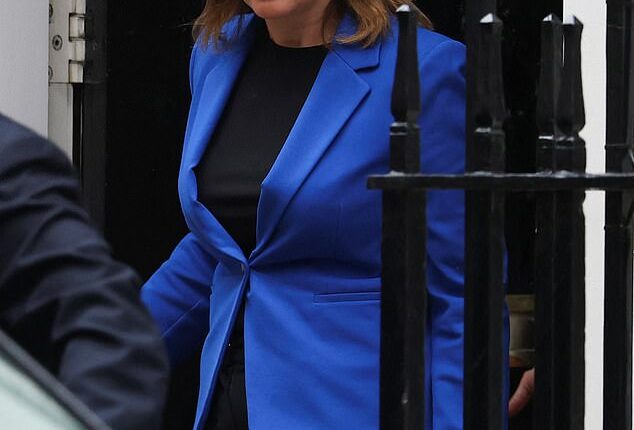Rachel Reeves is facing warnings about a financial crisis today as markets batter Britain’s borrowing costs.
Ministers are struggling to cool alarm after interest rates on UK gilts rose again this morning, having spiked to 27-year highs yesterday.
The grim moves have fuelled questions over how the Chancellor will service the country’s debt mountain.
Ms Reeves’ Tory predecessor Ken Clarke is among those raising concerns that a crunch is ‘much nearer’ than the government is admitting.
He suggested it is not impossible that Britain will be forced to go to the IMF for help – something that Callaghan’s Labour government did during the Sterling crisis in 1976.
Ms Reeves is expected to confirm today that the Budget will be held on November 26, later than many had anticipated.
But Tories have cautioned that ‘damaging uncertainty’ cannot be allowed to continue for another three months.

Rachel Reeves is facing warnings about a financial crisis today as markets batter Britain’s borrowing costs

Interest rates on 30-year UK gilts went up again in early trading this morning reaching 5.75 per cent
Economists have also been warning that Ms Reeves cannot rely on tax hikes alone to fill a black hole in the books that could be as much as £40billion or £50billion.
Many believe ramping up the burden on Brits further would only suppress growth and create a ‘doom loop’ where taxes need to be increased again.
Although government borrowing rates around the world have been surging, the UK is seen as particularly badly hit – partly because inflation is running higher here.
Yields on 30-year UK bonds, known as gilts, leapt to 5.7 per cent yesterday, the highest level since 1998 in the wake of Keir Starmer’s reshuffle seen as sidelining Ms Reeves.
The rate went up again in early trading this morning reaching 5.75 per cent.
Investors are betting that more bonds will need to be issued to finance further borrowing.
Lord Clarke told the Financial TImes that Britain is ‘much nearer to the risk of a financial crisis than the government is remotely acknowledging’.
Jim Reid of Deutsche Bank said: ‘We’re seeing a slow-moving vicious cycle: rising debt concerns push yields higher, worsening debt dynamics, which in turn push yields higher again.’
However, Treasury minister Lord Spencer Livermore has insisted the bond movements are ‘orderly’. Much of the state borrowing is through 10-year gilts, which have seen smaller shifts.
Downing Street stressed yesterday that the government’s commitment to its fiscal rules remained ‘iron clad’.
‘You’ll have seen since this Government took office that we have taken the necessary decisions to stabilise the public finances, drive growth,’ the PM’s spokesman said.
‘Our fiscal strategy has been backed by the IMF and others, and our approach has helped interest rates to be cut five times since the election, which is the best way to bring borrowing costs and inflation down.’
Asked whether the shake-up of Sir Keir’s team was a blow to the Chancellor’s authority, the official said: ‘No, and as I say it reflects the strengthening of the relationship between the Prime Minister and the Chancellor, a determination to drive growth in the economy, a recommitment to our robust fiscal rules.’
Inflation has been running at an 18-month high and is expected to climb towards 4 per cent.
There are warnings that gilts yields could surge to more than 6 per cent by the end of the year.
Ms Reeves is expected to confirm this morning that the Budget will be held on November 26. But that is two weeks beyond the 10-week notice period the Office for Budget Responsibility watchdog normally requires.
Shadow business secretary Andrew Griffith said: ‘Almost three whole months of speculation as to how Labour will fix their own mess is not good for anyone.
‘A Budget date as late as 26 November just inflicts damaging uncertainty on business.’
Mark Dowding, fixed income chief investment officer at RBC BlueBay Asset Management, said: ‘Investors have concluded that relying on tax hikes alone to close a fiscal shortfall, is destined to end in failure.’

Yields on 30-year UK bonds, known as gilts, leapt to 5.7 per cent yesterday, the highest level since 1998 in the wake of Keir Starmer’s (pictured) reshuffle seen as sidelining Ms Reeves









